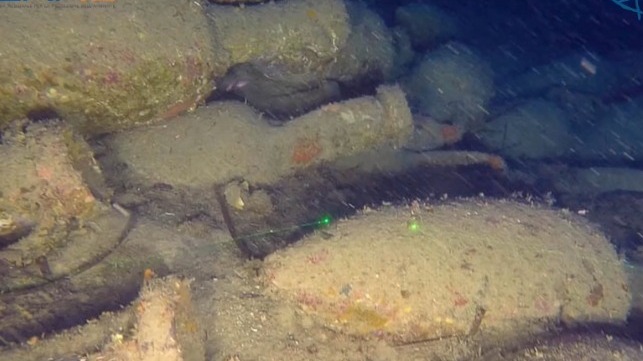Video: Archaeologists Discover Roman Wreck Laden With Amphorae

Italian archaeologists have discovered a Roman wreck from the second century B.C. off the coast of Sicily. The sunken vessel was located in about 300 feet of water off Isola delle Femmine, near Palermo, and it was heavily laden with amphorae - likely of the type used to carry wine.
The discovery was part of an underwater reconnaissance campaign conducted by the Regional Agency for Environmental Protection (ARPA Sicilia) and the province's superintendent of the sea (SopMare) to verify archaeological finds in deep waters. The first images of the find were detected and acquired by Arpa technicians using an ROV from the deck of the oceanograpic vessel Calypso South.
"The Mediterranean continually gives us precious elements for the reconstruction of our history linked to maritime trade, the types of boats, the transports carried out, the thalassocracies, but also data relating to life on board and the relationships between coastal populations," said Sicily's Superintendent of the Sea, Valeria Li Vigni. "The discovery confirms the presence of numerous archaeological remains in the bathymetric bands over 50/80 meters, which stimulates us to continue our research in the deep sea."
The activity is a bit out of the normal scope of ARPA Sicilia's mission, as it is not strictly focused on environmental protection, but director Vincenzo Infantino said that it is a valuable way in which the agency can contribute to Sicilian heritage. "The study and monitoring of the marine environment, constantly operated by Arpa Sicilia continues to enrich the picture of the precious beauties present in the Sicilian sea . . . whose protection is an essential imperative for our community," he said.
It was the mission's second find in a matter of months, following on the heels of the discovery of another Roman wreck off the coast of Ustica - also laden with amphorae and likely dating to the second century B.C.
Amphorae were the shipping containers of their day, widely used to transport wine, olive oil and food on board merchant vessels in the Mediterranean basin. They were employed by the Phoenicians, the Greeks and the Romans alike; as many of these ceramic vessels have survived through the ages, they provide archaeologists with valuable clues about the trading patterns of the era.
No comments:
Post a Comment